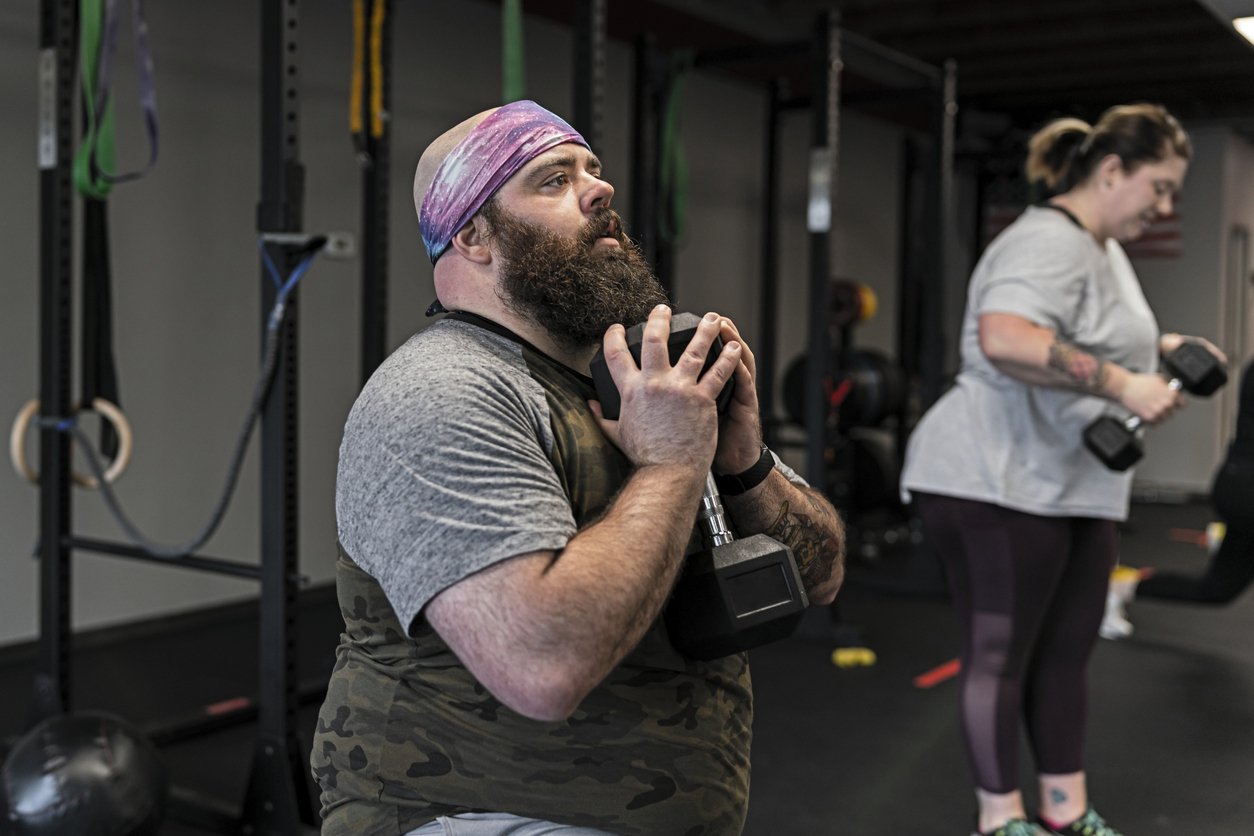In my twenties, I suffered so badly from an autoimmune condition that there were long stretches when I couldn’t get out of bed, let alone do my job or enjoy life. Eventually, I dragged myself to a registered dietitian who worked at a holistic health clinic in New York City and begged her for help.
While I sat in front of her, weeping with pain, frustration, and confusion, she fire-hosed me with information about autoimmune disease, molecular mimicry, and inflammation. Not once did she even look up to meet my gaze.
All she had to say at that moment was, “Hey, I’m here. I see you. I’m sorry you’re struggling with this. There is a way out, and we’ll get there together. What do you need the most right now?” But she didn’t say any of that.
Looking back, that’s the moment — although I didn’t realize it then — when I decided to become a health coach.
Unlike traditional medical practitioners who may rush you through an appointment, coaches take the time to understand your unique goals, challenges, and health history. They take a holistic view of your lifestyle, values, and motivations, helping you identify obstacles to progress. In doing so, they can better understand your overall well-being.
Research shows that health coaching can help clients transform their lives. It can help people manage chronic conditions like diabetes and hypertension, achieve meaningful weight loss, and adopt healthier habits that stick.
The benefits go deeper than physical health, too. Clients often report improved emotional well-being, boosted confidence, and a greater sense of control over their lives.
Enlisting the help of a health coach is one way to create a practical and meaningful action plan for your health — one that is achievable and deeply aligned with what matters most to you.
A subset of health coaches are choosing to specialize further in plant-based coaching. These coaches use the pillars of lifestyle medicine to help their clients enact meaningful and lasting changes to their health, specifically helping people add more whole and unprocessed plant-based foods to their diets.
So, how does it all work? What exactly is plant-based coaching? Is coaching worth the investment? And most importantly, how do you find the right plant-based health coach to align with your unique goals and needs?
What Is Plant-Based Coaching?

Plant-based coaches are health coaches with specialized training in whole food, plant-based nutrition, and lifestyle. They are trained to support clients in adopting and maintaining new behaviors and have the expertise to focus on the unique challenges and rewards associated with plant-based living.
Transitioning to and maintaining a plant-based lifestyle can be challenging. Without proper support, many people return to their old diets after a brief flirtation with plant-based eating.
Why do they give up? Many clients may struggle with a lack of cooking or shopping skills, limited knowledge to make the best nutritional choices, constraints like time or money, and the absence of emotionally supportive relationships.
Others may have concerns about avoiding deficiencies, navigating the ever-more-tempting landscape of highly processed vegan foods, getting enough calories, and dealing with social pressure to conform to familial and cultural eating patterns.
What sets plant-based health coaches apart from other health coaches is their deep knowledge of plant-based nutrition, which allows them to address these specific challenges and needs.
Plant-based coaches offer powerful, evidence-based solutions and client collaboration to clarify goals, build real skills and understanding, and co-create healthy and well-balanced menu plans.
The Benefits and Impact of Coaching
As the benefits of health coaching continue to transform lives, even the American Medical Association (AMA) recognizes its potential.
In a recent statement, the AMA educates physicians about the critical role health coaches can play in empowering individuals:
“By bridging the gap between the physician and patient, health coaches can help practices improve patient engagement in their care, leading to healthier patients with better outcomes.”
This alignment underscores the growing recognition of coaching as a catalyst for better health and more meaningful connections in care.
1. Coaching for Overall Well-Being

Coaching can significantly enhance overall well-being by addressing both physical and emotional health.
A 2014 review of 13 studies showed that health coaching positively impacted patients’ physiological, behavioral, and psychological well-being and enhanced their social interactions. The researchers highlighted significant improvements in weight control, increased physical activity, and better overall physical and mental health.
Coaching can benefit people across the age spectrum. A 2017 study found that it helped older adults become more physically fit, which improved their mobility and vitality.
The benefits of coaching are so profound that mainstream medical establishments are starting to take notice. A 2014 study conducted at the prestigious Mayo Clinic, involving 100 employees, found that wellness coaching improved quality of life, depressive symptoms, perceived stress levels, and physical, social, emotional, cognitive, and even spiritual functioning.
2. Coaching for Weight Loss and Management

Health coaching is also a powerful tool for achieving healthy weight loss goals. One study found that obese people who worked with a professional or peer health coach lost almost 10% of their body weight over 6 months.
Another study found that health coaching was associated with significant and sustained weight loss in overweight and obese adults. Participants lost an average of over 7% of their initial weight after 12 months and kept almost all the weight off after 24 months.
According to a 2018 review article in the American Journal of Lifestyle Medicine, 80% of clinical trials focused on nutrition and weight management coaching reported improvements, demonstrating its effectiveness in helping individuals adopt sustainable habits and achieve their weight loss goals.
3. Coaching for Chronic Lifestyle Diseases

Health coaching offers transformative benefits for individuals managing many serious chronic diseases. A 2018 review of 22 studies found that coaching helped people with type 2 diabetes lower their HbA1c levels (a long-term measure of blood glucose levels) and improve their overall well-being.
A 2019 meta-analysis of 10 randomized controlled trials found that health coaching was linked to improved quality of life and reduced hospital admissions in patients with chronic obstructive pulmonary disease (COPD).
Health coaching has also been found to improve cardiovascular outcomes. A 2016 study showed that participants who received health coaching experienced clinically relevant improvements in key health markers, including blood pressure, cholesterol levels, triglycerides, fasting glucose, body weight, BMI, waist circumference, and cardiorespiratory fitness. That’s a long list of very good news!
Is Health Coaching Covered by Insurance?
We’ve just heard a lot of good news about the effectiveness of health coaching in improving health outcomes. It turns out it’s also effective in reducing healthcare costs.
Despite this fact and the increasing credibility of health coaching in the medical field, most insurers still do not offer coverage under standard circumstances.
That’s unfortunate, as the lack of coverage can make coaching inaccessible for some, even as demand grows. However, in certain cases, clients in the US may be able to use Flexible Savings Account (FSA) or Health Savings Account (HSA) funds to pay for health coaching services.
Health coaching may qualify for reimbursement through these accounts if it is deemed medically necessary and prescribed by a healthcare provider. A Letter of Medical Necessity (LMN) may be requested, and many healthcare plans require the health coach to be certified by the National Board for Health & Wellness Coaching (NBHWC).
Coaches can also help clients bridge the financial gap. Many health coaches offer flexible payment plans and use platforms like PayPal, with multi-payment capabilities, to provide payment options tailored to clients’ financial needs.
Another way coaches can help clients with reimbursements is by partnering with licensed healthcare providers and enabling billing under the provider’s credentials where permitted by state laws and insurance policies.
Ways To Work With a Health Coach
Coaching is available in various formats to suit different needs, preferences, and budgets.
One-on-one or in a Group

At the high end, one-on-one coaching offers tailored support to those seeking the most personalized option.
This format allows for deep exploration of individual goals, challenges, and strategies, making it ideal for clients looking for customized guidance and close attention from their coach in a setting of total confidentiality.
Group coaching is typically less expensive and provides the added benefit of a supportive community in addition to the coach. In a group setting, participants can share experiences, learn from one another, and hold each other accountable, creating a dynamic environment for growth and collaboration.
Remote or in Person

Group and one-on-one coaching can be conducted remotely or in person. Remote coaching — on the phone or a video call — increases accessibility, as clients can connect with a coach anywhere in the world. This model often offers greater scheduling flexibility.
Conversely, in-person sessions can offer a more intimate and immersive experience for those who prefer face-to-face interaction. Whichever you choose is a matter of personal preference; online health coaching is as effective as face-to-face coaching.
Text-Based and Automated

In recent years, tech companies have entered the coaching space, offering lower-cost “one-on-one” coaching that relies heavily on automation, notifications, and text-based interactions. This approach has its pros and cons.
On the positive side, it makes coaching more accessible and affordable. It leverages technology to provide regular reminders, progress tracking, and touchpoints that support accountability and consistency.
The convenience of text-based coaching also allows for flexible, on-the-go communication, which can appeal to busy individuals.
However, the reliance on automation and limited human interaction can be a drawback for clients who value deeper, more personalized connections. Text-based communication may lack the nuance and emotional depth of face-to-face or live virtual coaching sessions, where body language, tone, and immediate feedback are important.
Additionally, while automation can provide structured guidance, it may not fully address the complexities of a client’s unique challenges or motivations.
For those seeking a high-touch, deeply personalized experience, traditional coaching formats might be a better fit.
How To Find the Right Coach for You
When choosing a health coach, verifying their credentials is crucial to ensure they have received proper training and adhere to professional standards. Look for certifications from reputable organizations like the National Board for Health and Wellness Coaching (NBHWC), which sets high standards for training in the US, or the International Coaching Federation (ICF), a globally recognized leader in coaching excellence.
For specialized areas, such as nutrition or lifestyle change, certifications from programs like the American Council on Exercise (ACE) for fitness or Food Revolution Network’s Plant-Based Coaching Certification (PBCC) for plant-based coaching demonstrate expertise in evidence-based practices tailored to those needs.
It’s also helpful to reflect on your personal needs and preferences to find the right fit.
- Do you thrive more in group settings, or would you rather have personalized attention in private one-on-one sessions?
- Are you looking for motivation, education, accountability, or all three? Do you need to develop skills—such as cooking, assertiveness, or negotiation—to adopt and maintain a health-promoting diet and lifestyle?
- Would it be better to work in person or remotely (depending on your schedule, geographic location, and mobility)?
Being clear about your preferences and priorities will help you choose a coach who aligns with your goals and offers the support you need.
Many coaches offer low-cost or free initial consultations, a great way to connect, ask questions, and see if their approach feels right for you. When exploring potential coaches, consider their personal experience, track record of success, and testimonials from past clients to understand their ability to support your goals.
Some coaches also share personal insights or philosophies through their blogs or social media accounts, offering another way to learn about who they are, what they value, and how they work.
As you explore your options, remember that coaching is a deeply personal and potentially transformative relationship. Finding the right coach is about more than credentials — it’s about the connection and rapport you feel with them.
Ready To Find — or Become — a Plant-Based Coach?

Coaching is a powerful, personalized approach to improving health and well-being.
Whether you’re managing a chronic condition, seeking sustainable weight loss, or striving to adopt healthier habits, the right coach can offer a supportive partnership that bridges the gap between knowing what to do and making it happen, helping you turn goals into lasting change.
By focusing on your unique needs, values, and motivations, coaching can become a transformative journey toward achieving the health and life you envision.
If you are interested in working with an FRN-certified plant-based coach, visit the Plantrician Providers Directory to find the right one for you.
If you’d like to help others on their journey toward plant-based living and health, you can learn more about FRN’s Plant-Based Coaching Certification and how it equips you to make a difference in others’ lives.
Tell us in the comments:
- Have you ever tried health coaching?
- What concerns do you have about plant-based coaching specifically?
Featured image: istock.com/SDI Productions



